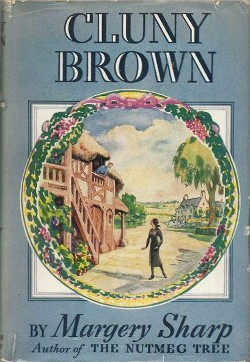 First edition | |
| Author | Margery Sharp |
|---|---|
| Published | August 1944 Collins (UK) Little Brown (US) |
| Pages | 270 |
Cluny Brown is a humorous coming of age novel by Margery Sharp, [1] published in August 1944 by Collins in the UK and Little Brown in the US. [2]
 First edition | |
| Author | Margery Sharp |
|---|---|
| Published | August 1944 Collins (UK) Little Brown (US) |
| Pages | 270 |
Cluny Brown is a humorous coming of age novel by Margery Sharp, [1] published in August 1944 by Collins in the UK and Little Brown in the US. [2]
The story follows the escapades of a plumber's niece, Cluny Brown, who is twenty years old in England in 1938. Cluny has high spirits and a constant desire for expansion of experience that leads the more staid members of her community to question whether she knows her place. As a consequence of one final London based excursion of discovery outside the bounds of what Cluny's mentors consider proper, she is sent off into good service at a charming country residence known as Friars Carmel to be a Tall Parlour Maid. The coincidental simultaneous arrivals of the young son and heir of the house, a mysterious Polish professor, and a beautiful socialite add complexity to this adventurous tale of a young woman following her dreams and finding her personal freedom in the tumultuous early 20th century.
The story was adapted into a 1946 film made by Twentieth Century-Fox, directed and produced by Ernst Lubitsch. [3]
In 1945 Wallace Morgan created a newspaper comic adaptation of Cluny Brown. [4]